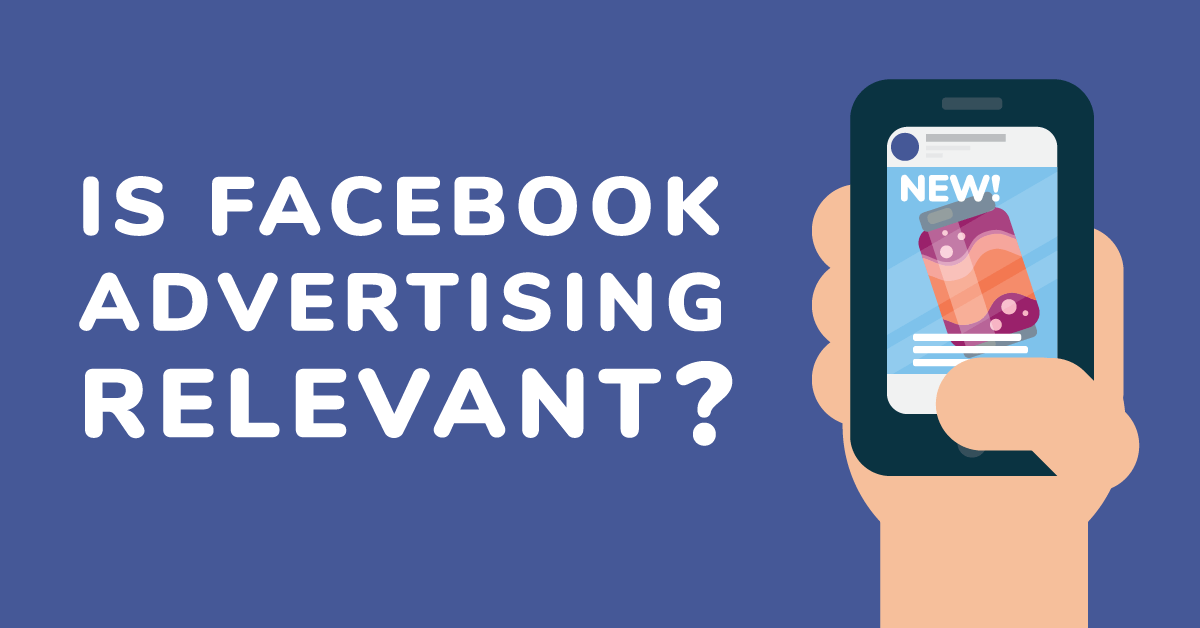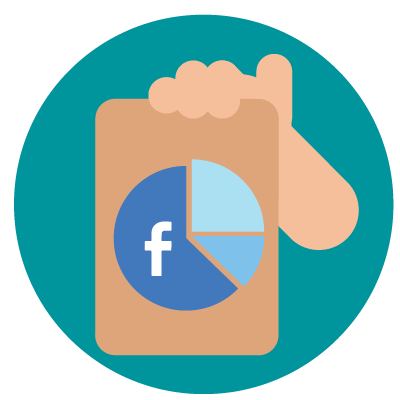Is Facebook Advertising Relevant?

Advertising on social media can be complicated – and in this constantly changing world, you need to be on the right platforms, not the dying ones. One day you’re in, and the next, you could be out. With no signs of the digital world slowing down, businesses wonder: is Facebook advertising still relevant?
With the changes Facebook has experienced in recent years, you may think the Facebook ship has long since sailed and users are jumping overboard by the dozen. This is not the case. Facebook advertising is still here and is a major presence in many businesses’ social media strategies. There are many reasons why Facebook has stayed on top, and we’re here to break down how and why it’s still a popular advertising platform. Read on to learn why Facebook advertising is still relevant and how you can leverage their ads for your business.
Paid advertising on Facebook
Do you remember a time when Facebook was ad-free? Unless you were a very early adopter, your answer is: probably not. Facebook has offered some form of advertising since the year of its inception. The ads platform we know today is much more robust than the rudimentary system that kicked off its advertising in the early 2000s.
Facebook Business Manager (now called Meta Business Manager) launched in 2014 and changed the game in social advertising. This tool allows brands to create pages and have their marketing strategies managed within the Facebook platform. Everything ad-related is here, from creative, to budget, to campaign performance data, making it an invaluable resource for businesses and marketers alike.
Why is Facebook advertising relevant?
Facebook’s massive user base and platform updates have helped them stay relevant amongst users and advertisers. There are a few major factors that contribute to this:

The decline of organic reach
Organic reach, or content that is not promoted, was once a major player in Facebook marketing. Brands grew a following on their Facebook pages and fans engaged with brand posts. This was a fantastic way to get in front of people without having to pay to play. Unfortunately, those days are over and, sadly, not coming back. Organic reach was successful due to Facebook’s algorithm at the time.
The Facebook algorithm decides which posts show up in users’ feeds and in what order those posts show up. If a brand created a post that got high engagement, it was served in the algorithm more often and reached more people. However, this algorithm was adjusted, and the reach of organic posts began to decline. Other types of media, like paid content and videos, became prioritized over organic posts. Studies show that these days, on average, a brand Facebook post reaches about 2.2% of page followers. That’s an incredibly small percentage.
With organic posts reaching a fraction of followers, brands wonder, why invest in a Facebook presence if nobody sees you? Should your energy and money go somewhere else, where quality content has a chance of being seen? It depends. If you want to keep social media in your marketing strategy, Facebook still offers major advantages over other social media sites.
A good social media strategy combines both paid and unpaid content. Posting organic content consistently alongside advertising the right products can produce results. Most importantly, you need to be where your audience is. That brings us to our second point –

Facebook has massive market share
Facebook’s market share is unmatched. They are the third most visited website in the US, right behind Google and YouTube. They were the top-visited social media site in 2021, a spot claimed since 2010. Facebook doesn’t just drive a ton of traffic – they also have the most users of any social media site.
Our point is: Facebook is massive. The huge user base is a major reason why businesses will continue to advertise there. If you need a social media platform that reaches a wide audience, converts more customers, and generates new leads, Facebook ads are worth the investment.

Facebook ads have powerful targeting capabilities
To run a successful ad campaign, you need to be where your audience is. You have the potential to reach over 2.9 billion people on Facebook, but you need to find the right people. You’re bound to discover the audience you’re looking for with Facebook’s targeting options.
Brands can target their ads to users based on demographics, customer lists, website visitors, app activity, post engagement, and more. These targeting options can be layered on top of one another, dialing into a hyper-specific group of people. Targeting is not a unique concept in social media advertising, but Facebook has an advantage with its technology and amount of user data.
Speaking of user data, you’ve likely heard a thing or two about this hot topic. How does Facebook know so much about users and their habits? Through tracking. Facebook tracks users on the platform and tracks users off Facebook across the internet.
From websites, apps, to physical places, pixels and cookies collect consumer data and send it back to Facebook. This information is invaluable to marketers. Knowing more about consumers leads to a better and more relevant ad experience. Yes, the thought of being tracked can be a bit creepy, but this integration between companies and services is quite common. All sorts of websites are collecting data to better understand consumers better – including Facebook.
These days, the conversation around privacy and data collection is shifting. Users are gaining more control over how they share their data. Apple’s iOS 14 privacy update offered privacy controls that limited how your phone tracked you. GA4 eliminated tracking through third-party cookies. This is not the death knell for targeting on social media. The information will shift, and as this part of social advertising evolves, ad strategies will evolve with it.

Facebook crushes the competition
Every year or so, a new social platform drums up hype. There’s TikTok. Clubhouse. Twitter Spaces. While these new and exciting apps create buzz, oldies like Facebook remain steadfast. This is because they can crush the competition.
Facebook has a massive team working to update technology and keep things fresh. When video platforms were on the rise, what did they do? Added reels and live videos to Facebook and Instagram. Facebook has identified the formats that drive engagement and sharing and added those features for brands and marketers to use. Wherever consumer behavior shifts in the future, chances are, Facebook will be adding this to its ecosystem.
Why aren’t Facebook ads working for me?
We’re telling you that Facebook ads are still relevant and drive sales. But, maybe you’ve had the opposite experience. Anyone with a Facebook page can advertise. You could boost posts or run Facebook ads. We have a post that goes over the differences between these two forms of advertising.
Perhaps you ran a campaign and didn’t see the results you expected. Your ads had great reach but nobody clicked through. Now you feel like you wasted thousands of dollars and did not see any return on your investment.
Some brands take on Facebook advertising with a DIY mindset. As with any part of business, the biggest mistake is not having a strategy and plan. Do you know who your target audience is? Are your creatives engaging and have the correct aspect ratio for optimal display? What goals are you trying to achieve by running these ads?
Just because you are an expert in your field, your product, or your service, this does not mean you are a marketing expert. There are a lot of moving parts that go into a campaign. And, as we’ve discussed, there are constant changes in the Facebook platform that impact advertising. It takes experience and legwork to see results.
The future of Facebook advertising
Is Facebook advertising relevant? After reading this article, we hope we answered this question for you. Facebook advertising is still relevant in many marketing strategies. If you’re considering investing in Facebook advertising, do your research and create a well-thought-out marketing plan. With a little effort, you can use Facebook ads to reach a large and engaged audience. Leaving Facebook out of a paid social media strategy means losing out on its huge user base, market share, and technological capabilities.
Advertising on Facebook will continue to adapt as new ad formats emerge, privacy and data regulations loosen or constrict, its user base fluctuates, and social media trends come and go. The brands that have thrived are the ones that share high-quality, engaging content and advertisements. With the right expertise and strategy, Facebook ads can move the needle and produce the results companies are looking for.


